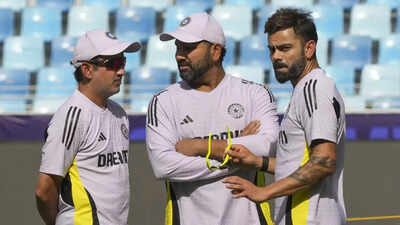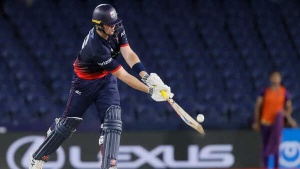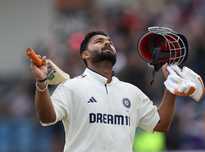Rohit Sharma Reveals Security Concerns and Electric Atmosphere Surrounding India-Pakistan Clash

The India-Pakistan cricket match is renowned for its unparalleled intensity, fueled by the deep-seated rivalry between the two nations. Indian captain Rohit Sharma, a veteran of numerous high-pressure encounters, has shared insights into the unique atmosphere surrounding these games.
Reflecting on the recent T20 World Cup 2024 clash, Sharma described the pre-match environment as a full-blown festival, extending from the team hotel to the stadium. India emerged victorious by six runs in a thrilling, low-scoring affair, with Jasprit Bumrah claiming the Player of the Match award for his impressive bowling figures of 3-14.
"Leading up to the India vs. Pakistan match, we received information about a potential security threat," Sharma revealed. "For two days before the game, we were restricted from leaving the hotel. The atmosphere was already building intensely. The hotel was incredibly crowded, with fans and media everywhere. It became clear that this was more than just another game; it was a special occasion."
He added, "As we approached the stadium, the atmosphere was electric. Both Indian and Pakistani fans were dancing and celebrating together. I've played many India-Pakistan matches, but the pre-match energy is always exceptional. Nothing quite compares to it." Sharma shared these thoughts on JioHotstar’s special 'Champions Waali Feeling Phir Se'.
During the match, India faced early setbacks with the dismissals of Virat Kohli (4), Rohit Sharma (13), and Axar Patel (20). However, Rishabh Pant played a crucial innings, scoring 42 off 31 balls, including six boundaries, which helped the team reach a total of 119. Unfortunately, the other middle-order batsmen failed to reach double digits.
Sharma lauded Pant's performance, emphasizing that the wicketkeeper-batsman played to his full potential and kept the team in contention on a challenging pitch.
"We wanted Rishabh to play his natural game, disrupting the bowlers and playing freely. He executed that perfectly. His innings of around 42 was equivalent to a score of 70 on that difficult surface, where something was always happening," Sharma explained.
He continued, "The ideal score on that pitch was probably 130 or 140, but we ended up with 119. Our initial plan was not to aim for 200; we were targeting 140. However, we lost wickets along the way. That's when Rishabh played that vital knock, which held the innings together. I felt that 119 could still be a good score, perhaps 10–15 runs short. I knew that if we could take 2–3 early wickets with the new ball, that 119 would feel like 160."
Sharma also praised the pace bowling duo of Jasprit Bumrah and Arshdeep Singh for their successful defense of the total, highlighting their value in the T20 format.
"With Bumrah, you need to be proactive in how you utilize him. He is a genuine wicket-taker who is also economical. Balancing these aspects is crucial, especially when the opposition is chasing at a run-a-ball. Arshdeep has also been outstanding," Sharma noted. "Over the past two years, he has become India's highest wicket-taker in T20Is for a reason – he is a very intelligent bowler."
"My focus was on strategically managing their remaining overs, considering the incoming batsmen and how they would handle Arshdeep and Bumrah. Given the difficulty for new batsmen to settle on that pitch, our aim was to force new players to the crease. That was our strategy," Sharma concluded.
Newer articles
Older articles
 Smith Eyes Grenada Test Return After Injury Recovery
Smith Eyes Grenada Test Return After Injury Recovery
 Google Maps Boosts Navigation Precision with Fused Orientation Provider Update
Google Maps Boosts Navigation Precision with Fused Orientation Provider Update
 Earth Sciences Minister Rijiju Expresses Frustration Over Atos Supercomputer Delay, Jeopardizing Weather Forecast Upgrades
Earth Sciences Minister Rijiju Expresses Frustration Over Atos Supercomputer Delay, Jeopardizing Weather Forecast Upgrades
 Washington Freedom Snatch Last-Ball Win Over Knight Riders in MLC Thriller; Playoff Hopes Soar
Washington Freedom Snatch Last-Ball Win Over Knight Riders in MLC Thriller; Playoff Hopes Soar
 East Africa Rift: Mantle Upwelling Drives Birth of New Ocean, Study Finds
East Africa Rift: Mantle Upwelling Drives Birth of New Ocean, Study Finds
 Colon Cancer: Don't Ignore These 5 Subtle Warning Signs
Colon Cancer: Don't Ignore These 5 Subtle Warning Signs
 Prasidh Krishna Vows to Sharpen Bowling After Costly Leeds Performance
Prasidh Krishna Vows to Sharpen Bowling After Costly Leeds Performance
 Gavaskar Urges India to Replace Thakur with Yadav for Second Test Against England
Gavaskar Urges India to Replace Thakur with Yadav for Second Test Against England
 Rishabh Pant's Unconventional Batting Style Is Revolutionizing Cricket, Says Greg Chappell
Rishabh Pant's Unconventional Batting Style Is Revolutionizing Cricket, Says Greg Chappell
 Vitamin B12 Deficiency: Cardiologist Explains Symptoms, Sources, and Why You're Always Tired
Vitamin B12 Deficiency: Cardiologist Explains Symptoms, Sources, and Why You're Always Tired